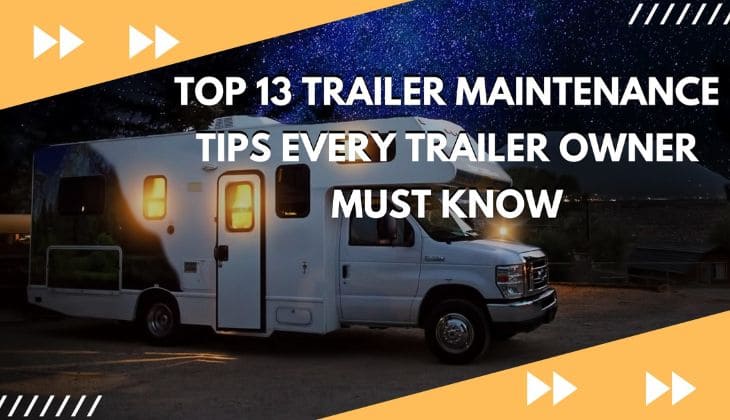Trucks require trailer Maintenance to transport weight. Trailers are the additional carrier vehicles you’ve probably seen hitched to trucks while traveling down the road. There are many distinct sorts of trailers, each with a respective load capacity and function. A trailer contains wheels but no engine. Our today’s blog is about trailer maintenance tips.
Therefore it must be hitched to a vehicle with a machine to function. The appropriate trailer is chosen depending on the item that must be transported. Some trailers are suitable for carrying weight while others used to transport goods that need protection from sun rays.
Each trailer type serves a distinct purpose. A trailer is a significant investment that may pay off in the long term. However, in terms of upkeep, it is critical to understand how one must maintain a trailer. As a trailer owner, you need to understand what you can handle yourself and what you should delegate to a professional.
This post will present you with 13 trailer maintenance tips to help you extend the life of your trailer and avoid trailer repairs that might cost you hundreds of dollars in the future. The article also discusses which types of maintenance you may handle yourself and which you must leave to a technician to prevent further problems.
13 Trailer Maintenance Tips

1. Examine The Tyre Pressure
Checking the tire pressure is one of the most critical aspects of vehicle trailer maintenance. Experts observed that trailer drivers often experience a tyre slip on a regular basis. One primary reason behind a slipping tyre is low pressure. Dealing with severe tire damage may involve costly repair expenses.
Therefore if you want to avoid these significant failures, you must maintain adequate tyre pressure. One must also ensure that the tyre is properly inflated at all times.
As a result, experts advised adding tire pressure monitoring and inflation devices. These technologies will notify you if the tire pressure is different than the recommended level. However, it is highly usual for these systems to fail and require maintenance. As a result, you can only rely entirely on such systems if you undertake regular maintenance.
2. Examine the suspension system
Because the suspension system in trailers is more intricate than other conventional automobiles, you will almost certainly require the services of a professional to inspect for any suspicious system faults. However, there are things you can do on your own to assist the technician and spot problems before they occur.
For example, the user may undertake a visual assessment to look for signs of wear and tear around the components, which includes even the minor components throughout the suspension system. In general, we want to ensure that no element interferes with the suspension when it is moving. Otherwise, you will have to cope with several troubles and issues.
3. Consider lubrication
Lubricating the trailer components is one of the vital maintenance tasks that must be done to avoid severe damage caused by overheating. When selecting the grease for lubricating your car, you must consider three essential qualities:
1. The thickness
2. The grade
3. And the rating
Most greases used to lubricate giant trucks consists of complex lithium compounds. Some, on the other hand, are heavy on calcium compounds. When purchasing your next grease, it is critical that you carefully examine the primary chemical used in the manufacture of the lubricant. Furthermore, experts advise that mixing two different lubricants would give worse results and reduce efficiency.
4. Check the brakes
Because the braking system is vital to your safety and that of others on the road, it’s necessary to examine and go for car brake service regularly. Two significant components needs examination while inspecting brakes:
Measure the angle between the slack adjustment and the gas chamber pushrod if your vehicle has spring breaks. This angle has to be 90 degrees. Otherwise, brake alignment is required.
Inspect the thickness of the drum to verify that there is enough material to last until the following service call. Consult your expert to see if this thickness is adequate to postpone brake servicing until your next maintenance appointment.
5. Maintenance of lights
A trailer might pose serious hazards to the cars behind if it lacks sufficient lighting; it’s essential to keep up with both lights and examine them regularly. For example, if you notice any evidence of corrosion or faulty electrical connections surrounding the lights, you must address them right away. Fixing the lights isn’t a costly affair; just imagine how much money you might spend on fines because of a burned or broken headlight.
6. Wash the trailer regularly
You may likely accumulate a lot of trash, pollutants, or chemicals on any trailer journey, especially at the under body of the trailer. As a result, experts advise cleaning the trailer regularly to remove any substances that may damage the surface or enter the vehicle’s steel structure.
Whenever you take your trailer out on a trip, experts recommend performing pre-and post-trip inspections. You should inspect the trailer at least once every 45 days and perform a thorough examination every 40 to 60 days. Some impurities or debris may get into the trailer, including it’s hydraulic system, which is principally responsible for the operation of your vehicle. When trash gets into the trailer’s hydraulic system, you will probably have serious issues that will cost thousands of money to repair.
7. Clean the inside as well
Most trailer owners concentrate on their vehicles’ outside and construction materials while entirely ignoring the interior. However, the inside is another crucial component to consider because even a little hole in the roof or sidewalls of the trailer may produce large leaks that can result in costly repairs.
As a result, keep an eye out for any minor furniture damage or hole before it grows much worse and necessitates costly repairs.
8. Maintain security standards
Another critical aspect of trailer maintenance tips is trying to keep up with security. Experts advise performing a complete visual assessment of the various security hardware components, such as the tie down straps, chains, ratchets, or any relevant details.
9. Keep a look out for indicators that indicate a problem
One of the most important things you can do for your trailer would be to maintain a close eye out for any indicators of potential difficulties. According to experts, if you notice any signs or uncover a problem early enough, you can cure it without needing to install essential components. In this manner, you can remedy the issues with minor repairs rather than installing items that cost you hundreds of dollars.
Furthermore, several web publications emphasize the indications of a faulty engine, gearbox, catalytic converter, etc. Once you’ve learned about these indications, you’ll be able to recognize severe issues and notify your mechanic.
10 Examine the frame & body
Finally, staying on top of frame and body concerns is vital. Loose connections and loose pieces are easy to identify. To avoid serious breakdowns, tighten all bolts and loose fasteners using a tool.
Choosing the correct wrenches & sockets might vary depending on where the trailer was built. American-made trailers, for example, employ imperial size, which is dependent on inch fractions. On the other hand, foreign-made campers use the metric system and demand larger sizes. As a result, before purchasing a costly wrench, be sure it is compatible with your frame system.
11. Communication
When it comes to trailer difficulties or necessary maintenance, drivers and maintenance professionals should maintain open lines of communication. It will guarantee that proper care is conducted and completed on schedule.
Proper selection, management, and preventative programming are equally critical in assuring each unit’s optimum durability, safety, and efficiency, irrespective of size.
12. Training and mechanics
Trailer owners may guarantee that anybody involved in the trailer’s operation has sufficient training to avoid damage to the trailer and for their own and others’ safety. Furthermore, verify that mechanics are well-trained in heavy-haul trailer maintenance and adhere to manufacturer specifications.
13. Maintain a record
Proper maintenance records are also essential to know if preventative maintenance is required.
It allows your organization to run more efficiently and prevents small concerns from becoming major ones. The right processes will hold relevant staff accountable for doing maintenance as needed.
Conclusion
A trailer is a significant investment, and it does, need particular care, and if properly maintained, you can avoid dealing with car mechanic and major failures that may cost you hundreds of dollars.
This post provided you with 13 car trailer maintenance tips to help you extend the life of your trailer and avoid severe malfunctions. These guidelines assist you in identifying problems before they become worse, allowing your technician to address them without needing any expensive components.
